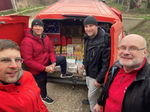Continuing the ministry to refugees
The context for the assistance Methodists provide in countries directly or indirectly bordering Ukraine is changing. Specialists are also raising awareness of possible psychological problems that could become more common in the future.
People of the UMC in the countries directly or indirectly bordering Ukraine continue their various activities to support Ukrainian refugees. In doing so, they are trying to meet the respective current challenges.
Timotej Tagaj, coordinator of Methodist aid activities for refugees in Slovakia, reports that work with and for refugees on the Slovak-Ukrainian border has now been taken over by large organizations such as the Red Cross and by the State itself. This, he says, has helped eliminate some negative aspects, such as the risk of exploitation of women with young children. "On the other hand, smaller organizations like the UMC that were and are willing to help there have been pushed away."
In her report, Jessica Morris-Ivanova, pastor in Shumen, Bulgaria, describes how social conditions are also changing. She tells of racist incidents occurring throughout the country. "Many are jealous of the help given to Ukrainians." In addition, she says, there have been some cases where people's food distribution and generosity have been abused.
In various countries, people from the UMC offer language courses for the refugees. In some cases, there are corresponding newly prepared materials for this in Ukrainian and the respective national language. Where the congregations also wanted to pass on encouragement and hope in the form of Christian literature, this is often easier to organize in Russian. This is, however, an increasingly sensitive issue. "Ukrainian refugees do understand Russian," says Szarlota Kaminska, coordinator of Methodist work with Ukrainian refugees in Poland, "but sometimes they don't want to speak the language and prefer not to communicate rather than do it in Russian."
The challenge of accompanying refugees will present special challenges not only to, but also to people of the UMC in the coming weeks and months. The longer people in Ukraine have had to live with war and the more they have seen and experienced, the more psychological support will be needed. At a recent meeting of Methodist pastors in Czechia, a psychologist spoke about post-traumatic stress disorder, reports Jana Krizova, who coordinates Methodist work there. This specialist explained that after overcoming the initial shock, up to 50% of refugees may have serious problems after six months and therefore need help. Those involved in pastoral care were urged to be patient in dealing with challenging behavior and not to treat such post-traumatic stress disorders themselves without an appropriate training background, but to refer affected people to specialists.
Furthermore, people from different countries are always on the road and bring relief supplies to Ukraine. For example, Methodists from Prague brought another shipment to the Hungarian-Ukrainian border, which is about 900 km away from Prague. These relief supplies supplemented a shipment to the area of the Ukrainian city of Dnipro, which is another 1200 km away. In Ukraine, the relief supplies were transported in small cars on dirt roads at night and without lights so that no one could shoot at the drivers.
The war continues. News of the Russian army's alleged war crimes against civilians in Buca and other places in Ukraine shocks. Especially the people of Ukraine. "I was completely depressed and unable to write," Methodist pastor Oleg Starodubets from Uzhgorod explains his silence on Facebook. "But we will continue our ministry to refugees and people in need," he affirms.
Julia, one of the first women to be admitted to the Methodist facility in Horni Pocernice in Prague (Czechia), also comes from the wider Kyiv area. A month ago, the young woman had arrived with her one-year-old daughter and eight-year-old son, accompanied by some other family members. Her husband had stayed in Ukraine to defend the country's capital. Julia, who had run a hairdressing salon at home and also offered hand and foot care, cannot be idle. And so, it was no surprise that after only a few days she began to cut the hair of relatives and friends of her hosts. And a few days ago, she asked for a piece of land to plant vegetables and herbs together with other women of the group.
May not only the seeds of this bed grow and flourish, but also the seeds of comfort, encouragement, hope and life that Methodists are sowing in the hearts of people from Ukraine in these difficult days.
Author: Sigmar Friedrich, Zurich

